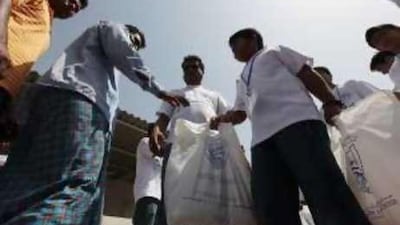DUBAI // Schoolchildren knocked on hundreds of paint-chipped doors in three labour camps bordering Sharjah yesterday, handing out packages of rice and lentils to astonished workers. Many labourers were not awake when the pupils from Our Own High School in Dubai came knocking at 9.20am.
In darkened, cramped rooms, crisscrossed with fraying washing lines, the men hurriedly woke up friends on bunk beds so they could receive their food packets. Other workers leaned over steel railings to wave at the children, who spread throughout the one-storey structures in the Sonapur district to deliver the parcels. The school's entire 4,750 student body pitched in, managing, in just one week, to collect 6.5 tonnes of rice and lentils to be delivered to almost all the 1,500 residents in the camps.
Some 53 pupils, accompanied by teachers and parents, delivered the parcels, as part of a project, not just to provide food to the workers, but also to teach the youngsters the importance of helping the needy. Children donated pocket money and appealed to neighbours and friends help pay for the supplies. "I have never seen anything like this before and I have lived in Dubai for 15 years," said Abdul Jani, 50, a welder from Pakistan who, like many others, earns about Dh1,000 a month.
"It makes me feel good, that people actually think of us." The workers said the food grains would be enough to feed them for four days. After spending Dh300 a month on food and sending money home, there is little left to save for themselves. "We come here because of difficult circumstances at home, but we never thought we will live like this," said Wakaf Ahmed, 20, a Pakistani electrician. "When children see us like this, they will learn humility. They will understand people can survive on almost nothing."
Standing near a leaking toilet, messy kitchen and overflowing rubbish bins, an Indian camp supervisor, Parvez Khan, said managers did the best they could. "It's good the children are distributing food. That's what workers need most," he said. Camp managers and school authorities asked the camp names not be published. A group of four friends from Grade 11 said they managed to collect 310kg of grain, worth about Dh400, by appealing to other children on the bus ride to school.
"I feel happy from the inside. I just felt happy seeing their [workers] faces when we met them," said Ahad Kidwai, 16, who along with his twin, Fahad, and friend, Jaidev Singh, carried sacks of grains in several bus trips from the supermarket. "It's helping us understand the world better, understand that there are so many people less fortunate," said Jaidev, 17. Afnan Siddibapa, 16, spent Dh150 of his savings to buy rice. "It shows that by ourselves we can do a little, but together we can help much more."
Younger pupils also pitched in. Austin Mendonca, 10, donated Dh20. "I didn't buy Coke and Pepsi. That's how I saved." After the distribution, children chatted in groups. "Even if we do such a small thing, it can still make people happy. It's taught me that good work is never wasted," said nine-year-old Shyam Hari, who asked his parents to contribute since he does not get pocket money. "I don't like people being poor. When I earn, I will give half my money to charity and live on the other half," vowed 10-year-old Harit Manojkumar.
His mother, Bindu Manojkumar, a biology teacher at the school, thought up the project, with the goal of collecting just one tonne of grains. But the effort snowballed. The school principal, Neville de Noronha, said the intention was to draw children out of their protected environment. "We want it to be a mind-set, not an activity" he said. "What touches me is how children skipped Coke or samosa [savoury snack] to buy rice. They chose to say 'no' to themselves and 'yes' to others." @Email:rtalwar@thenational.ae


